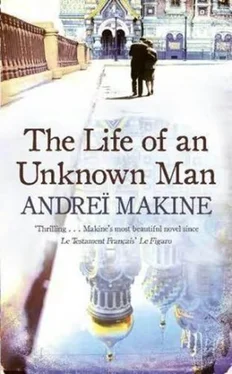Andreï Makine - The Life of an Unknown Man
Здесь есть возможность читать онлайн «Andreï Makine - The Life of an Unknown Man» весь текст электронной книги совершенно бесплатно (целиком полную версию без сокращений). В некоторых случаях можно слушать аудио, скачать через торрент в формате fb2 и присутствует краткое содержание. Жанр: Современная проза, на английском языке. Описание произведения, (предисловие) а так же отзывы посетителей доступны на портале библиотеки ЛибКат.
- Название:The Life of an Unknown Man
- Автор:
- Жанр:
- Год:неизвестен
- ISBN:нет данных
- Рейтинг книги:3 / 5. Голосов: 1
-
Избранное:Добавить в избранное
- Отзывы:
-
Ваша оценка:
- 60
- 1
- 2
- 3
- 4
- 5
The Life of an Unknown Man: краткое содержание, описание и аннотация
Предлагаем к чтению аннотацию, описание, краткое содержание или предисловие (зависит от того, что написал сам автор книги «The Life of an Unknown Man»). Если вы не нашли необходимую информацию о книге — напишите в комментариях, мы постараемся отыскать её.
The Life of an Unknown Man — читать онлайн бесплатно полную книгу (весь текст) целиком
Ниже представлен текст книги, разбитый по страницам. Система сохранения места последней прочитанной страницы, позволяет с удобством читать онлайн бесплатно книгу «The Life of an Unknown Man», без необходимости каждый раз заново искать на чём Вы остановились. Поставьте закладку, и сможете в любой момент перейти на страницу, на которой закончили чтение.
Интервал:
Закладка:
And yet… He is the absolute prototype of a man ditched by a woman young enough to be his daughter. The plot for a lightweight novel in the French manner, a hundred pages of Parisian bed-hopping and gloom. All a love affair such as his would be worth.
He crouches down in the corner where Léa’s things are piled up. “You’re not a failure,” she told him one day. “No. You’re not even embittered. Not like one of those East Europeans, people like Cioran and the rest. You’re just unlucky. Like someone… like someone who…” (she was searching for the word and he was wild with gratitude: she’s understood me, I’m not a professional failure!)- “That’s it. You’re like an undetonated shell with its devastating power intact. You’re an explosion still waiting to be heard.”
In all his life no one had spoken to him like that. He had lived to the age of fifty, done a great deal of reading and study, experienced poverty and fleeting success, gone to war and come close to death, but it had taken a young Frenchwoman to explain to him what other people regarded as a wasted life. “An explosion still waiting to be heard…” Which, in fact, is the common fate of all true artists. Very intelligent, that girl. Dear, good Léa. “My Léa…”
Or else, maybe just a bitch who made use of this dovecote while she had nowhere else to stay and who’s going off now because she found herself a “guy” who’ll give her a roof over her head. A young “babe” setting out to conquer Paris, leaving Shutov to rot, an old madman obsessed with his search for an epithet to describe that lunar whiteness on the rooftops.
“I love you, Nadenka…” He pours himself another whiskey, downs it with the grimace of one who has seen through the universal grubbiness of human nature, but, at the same time, with a writer’s reflex, observes himself and finds his own posture false and exaggerated. No, there’s no point in doing a bitter little Cioran number of his own. For whose benefit, in any case? Freed of the mask of disgust, his face softens, his eyes mist over. “I love you, Nadenka…” If that story still works, Shutov tells himself, it’s because I once knew a love like that. And that was… yes, more than thirty years ago.
Except that it happened not in winter but beneath the translucent gold of autumn. The start of his studies in Leningrad, a feminine presence along pathways redolent of the acrid tang of dead leaves. A girl of whom the only trace now is a tenuous silhouette, the echo of a voice…
The telephone rings. Shutov struggles out of the sofa’s depths, stands-a drunken sailor on a ship’s deck. The hope of hearing Léa sobers him up. His racing thoughts imagine a combination of excuses and backpedaling, which might enable them to get together again. He lifts the receiver, hears a dial tone, and then, on the other side of the wall, a vibrant male voice: his neighbor, an Australian student whose antipodean friends often telephone during the night. Since Léa’s departure Shutov’s ear is constantly cocked (telephone, footsteps on the stairs) and there is little sound insulation in his attic. His neighbor laughs with frank, healthy candor. To be a young Australian with fine white teeth, living amid the rooftops of Paris. Bliss!
Before sinking back into the depths of the sofa he wanders around to the corner where Léa’s cardboard boxes are stacked. There is a bag of her clothes as well. The silk blouse he gave her… One day they bathed in the sea, near Cassis-she got dressed and when she tossed her hair back in a swift movement to tie it up, her wet locks made a pattern of arabesques on the silk… He has forgotten nothing, the fool. And these memories tear at his guts. No, at his eyelids, rather (make a note: the pain rips away your eyelids, making it impossible to banish the vision of the woman who has left you).
Damn those eyelids! Always his scribbler’s mania. The conclusion is simpler than that: a young woman who breaks up with an aging man should never leave him alive. That’s the truth! Léa should have knifed him, poisoned him, pushed him off that old stone bridge in the alpine village they visited one day. It would have been less inhuman than what she did. Less tormenting than the sleek softness of this silk. Yes, she should have killed him.
Which, in fact, is more or less what did happen.
Shutov remembers clearly the precise moment when the execution took place.
They often used to argue but with the theatrical violence of lovers, aware that the fiercest tirades will fade away at the first moans of pleasure. Shutov would rage against the poverty of contemporary literature. Léa would drum up a whole army of “living classics” to contradict him. He would thunder against writers castrated by political correctness. She would quote what she called a “brilliant” passage. (It was, among other things, about a son held on a leash mentally by his mother while he makes love to a woman.) They would loathe one another and, half an hour later, adore one another, and what was really important was the glow from the sunset coming in through the skylight, gilding Léa’s skin and heightening a long scar on Shutov’s shoulder.
For a long while he turned a blind eye. The tone of their arguments changed: Léa becoming less combative, he more virulent. He sensed a threat in this indifference and was now the only one still ranting and raving. Especially that evening when he had received one of his manuscripts back, rejected. That was when, picking her way between words, she had compared him to an explosion unable to make itself heard… After they had split up Shutov would come to perceive that this had been the last flush of tenderness within her.
Then the dismantling began (beneath the windows of his attic workmen were removing some scaffolding: yet another stupid parallel, the writer’s mania) and their union was taken apart as well, a story at a time. Léa came increasingly rarely to the dovecote, explaining her absences less and less, yawning and letting him shout himself hoarse.
“The awesome power of a woman no longer in love,” thought Shutov, peering at himself in the mirror, feeling the crow’s-feet around his eyes, promising to be more conciliatory, a little more devious about his own convictions, to come to terms with her “living classics”… Then took to shouting again, invoking the sacred fire of the poets. In a word, making himself unbearable. For he was in love.
The assassination took place in a café. For ten minutes or so, Shutov made an effort to be nice, gentil , as the French say, then, unable to hold back, erupted (“an explosion!” he thought later, mocking himself). Everything came under fire: the wheeling and dealing of the book world, the fawning wordsmiths who suck up to the hoi polloi as well as the cultural elite, Léa herself (“The truth is you’re just a groupie to that rotten little clique”), even the newspaper poking out of her bag. (“Go ahead! Lick the boots of your armchair socialists. Maybe they’ll take you on as a stringer for their Paris Pravda ”)… He felt ridiculous, knowing there was only one thing he should be asking her: do you still love me or not? But he dreaded her reply and clung to the memory of their arguments in the old days, which used to founder, lovingly in an embrace.
At first Léa succeeded in passing off the scene to the customers in the café as a somewhat lively but amicable squabble. Then came the moment when the acrimonious tone was no longer fooling anyone: a middle-aged gentleman was “bawling out” his girlfriend, who was, incidentally, far too young for him. Léa felt trapped. Get up and walk away? But she still had quite a lot of stuff to collect from this madman’s attic and he was capable of throwing it all out into the street. Shutov would never know if such thoughts passed through her mind. Léa’s face hardened. And with a bored expression she aimed her blow where she knew him to be defenseless.
Читать дальшеИнтервал:
Закладка:
Похожие книги на «The Life of an Unknown Man»
Представляем Вашему вниманию похожие книги на «The Life of an Unknown Man» списком для выбора. Мы отобрали схожую по названию и смыслу литературу в надежде предоставить читателям больше вариантов отыскать новые, интересные, ещё непрочитанные произведения.
Обсуждение, отзывы о книге «The Life of an Unknown Man» и просто собственные мнения читателей. Оставьте ваши комментарии, напишите, что Вы думаете о произведении, его смысле или главных героях. Укажите что конкретно понравилось, а что нет, и почему Вы так считаете.









